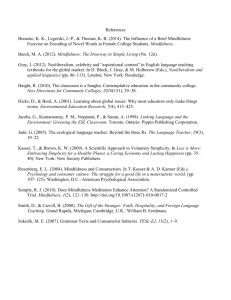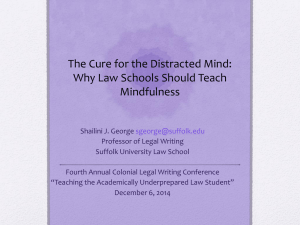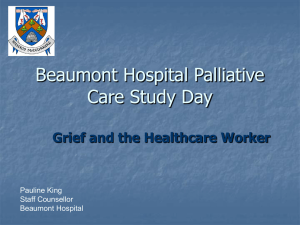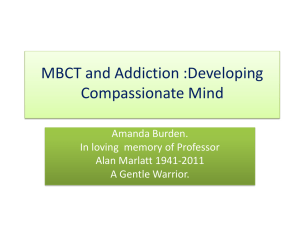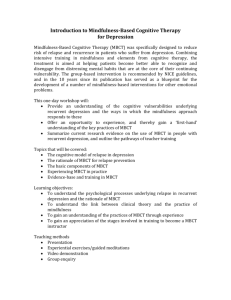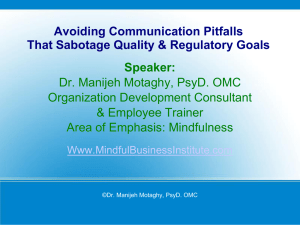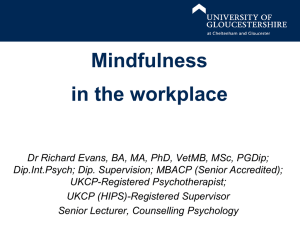Mindfulness Based Cognitive Therapy in Psychiatry – Indications
advertisement
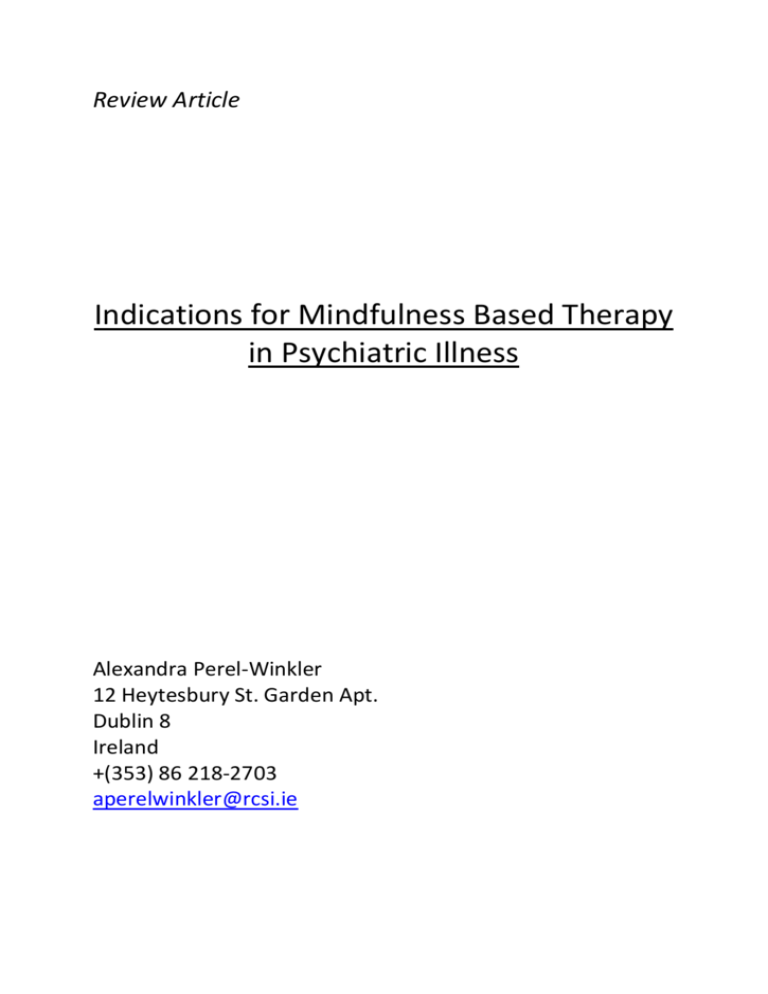
Review Article Indications for Mindfulness Based Therapy in Psychiatric Illness Alexandra Perel-Winkler 12 Heytesbury St. Garden Apt. Dublin 8 Ireland +(353) 86 218-2703 aperelwinkler@rcsi.ie Abstract Background: Mindfulness has been successfully incorporated into therapeutic programs for physical illness and stress reduction. Recently Psychiatric studies have considered the benefit of Mindfulness Based Cognitive Therapy (MBCT) in the treatment of severe and/or chronic psychiatric disease. This review synthesizes the most recent and relevant research on Mindfulness Based Cognitive Therapy and its role in psychiatric treatment. Methods: PubMed, CochraneReviews and TRIPDatabase were searched for relevant and recent psychiatric studies examining the effects of mindfulness and related therapies on depression, bipolar disorder, anxiety, personality disorders and substance abuse. Limits were placed on the initial search to find meta-analyses to look for papers with the highest level of statistical power. Results: Evidence based research findings suggest that adjunctive MBCT to standard care results in improved measures for many different classes of psychiatric patient. Decreased rates of relapse and control of residual symptoms in affect disorders, and improved control in personality disorders and substance abuse were consistently reported. However, many studies had low power, with small sample sizes and lack of randomization. Conclusion: Mindfullness Based Cognitive Therapy is a cost effective, well tolerated method of improving the management of psychiatric disorders. More research is needed to improve on methodological shortcomings. Mindfulness Based Cognitive Therapy (MBCT) is a psychological intervention that has integrated aspects of Cognitive Behavioural Therapy (CBT) with Mindfulness Based Stress Reduction (MBSR) programs. The concept of mindfulness is understood as the process of ‘paying total attention to the present moment with non-judgmental awareness’. [1] Mindfulness based stress reduction programs have been shown to be beneficial for physical and mental ailments – boosting immune function, decreasing pain sensation, increasing cognitive function among many described benefits. [2] Studies have pointed to the potential uses of Mindfulness based stress reduction to optimize standard practice as an adjunctive therapy for a multitude of medical specialties. [3] Recent Psychiatric research has endeavoured to explore the potential of mindfulness based therapies, particularly MBCT, and its effect in Major Depression, Generalized Anxiety, Personality Disorders and Substance Abuse, yielding positive results. The 8 week MCBT program attempts to increase patient’s awareness of their thoughts, feelings and physical experience while recognizing these things as transient events. [1] By focussing solely on the present moment, participants learn to avoid becoming overwhelmed with their internal mental phenomena and emotional experiences. This allows people to observe and detach from habitual ruminations and fixed dysfunctional patterns. While treatment for psychiatric illnesses has improved vastly since the development of modern antidepressant and the application of CBT, significant numbers of psychiatric patients are left with residual symptoms, relapses, or are resistant to the current best practice efforts .[1] MCBT has been shown to be most successful as an adjunctive therapy when treating major psychiatric disorders. Improvements in remission rates, time spent in remission, reduction of residual symptoms and prevention of relapse are the major findings. Mindfulness in Major Depression Depression is considered one of the top contributors to morbidity worldwide by the World Health Organization.[4] Individuals suffering from depression have a 33% risk of relapse after multiple trials with pharmacologic treatments and an increased rate of death by suicide.[1] Depression is a chronic condition, and as such is an emotional, social and economic burden for patients, families and their community. It has been suggested that the process of ‘rumination’, the continual thinking about one’s feelings and symptoms of depression, is a central cause of the perpetuation of the depression itself. MBCT teaches participants to observe thoughts and feelings through the practice of meditating on a neutral experience in the present moment, such as breathing.[4] Several studies have looked at MCBT in patients with three or more episodes of serious depression, examining the efficacy of standard care with and without an 8 week intensive MCBT course. Results were positive – fewer patients with adjunctive MBCT relapsed in the following 12 months (32% v 60% in the control group). Other studies have shown that adjunctive MBCT is significantly better at lowering residual depressive symptoms in comparison to anti-depressants alone. [1] Using the Beck’s Depression Index to assess depressive symptoms objectively and in a comparable manner, studies showed significant change in depression scores, particularly the items including suicidality, sadness, loss of interest, guilt and lack of pleasure.[1] Mindfulness in Generalized Anxiety Generalized Anxiety Disorder (GAD) is a chronic disease currently treated with Cognitive Behavioural Therapy and anxiolytic pharmacotherapy. This chronic disease is characterised by relapse, high rates of sympathetic strain causing physical morbidity in addition to the longterm, extreme worry. As the basis of GAD is rooted in intense, repetitive worry about uncontrollable events, it has been proposed that MBCT would be indicated in order to help the person develop a more detached and objective view of the contents of their thoughts. Increasing awareness of thought patterns is said to allow greater room for integration of coping strategies, and as a secondary features decreases nervous system arousal and physical stress symptoms . [5] In a study observing the effects of an 8 week MBCT program for patients with GAD, both Beck Anxiety Inventory (BAI) and Penn State Worry Questionnaire (PSWQ) were significantly reduced at the completion of the program. The group described a decrease in their anxiety, tension, and mood symptoms and also described an experience of increased mindful awareness in their everyday life. In another study patients in a minimum of a 6 month remission of GAD after pharmacotherapy treatment were allocated to MBCT or psychoeducation groups. Those that had the mindfulness training reported significantly lower BAI scores and decreased residual anxiety symptoms than those with the psychoeducation.[1] Mindfulness in Borderline Personality Disorder The concept of Mindfulness has been incorporated into a unique form of treatment therapy called Dialectical Behaviour Therapy (DBT), which has had great success in people exhibiting Borderline Personality Disorders. DBT is an integration of mindfulness with training programs aimed to enhance participant’s ability to tolerate distress, affect changes, and regulate behaviour. Studies have shown treatment with DBT has led to the reduction of self harm/suicidal behaviours, admissions to inpatient treatment, and measures of anger in Borderline patients. [3] Mindfulness in Substance Abuse Addictive substances impair brain systems causing a deregulation of mesolibic dopaminergic reward, motivation and inhibitory pathways.[3] These pathways are deeply integrated with all brain functions and thus have great effect on attention and mood. Cognitive Behavioural Therapy is currently the cornerstone of addiction treatment aiming to point out stimuli leading to substance use and supplement new behaviours that are incompatible. Unfortunately, relapse rates are said to range from 50-90%, 30% of which are believed to be precipitated by low mood or anxiety. It is known that co-morbid mood or anxiety disorders exacerbate substance abuse and decrease periods of abstinence.[3] This can be understood as substance abuse causes an adaption to increased dopamine concentration at the synaptic cleft. Cessation of substance use causes a sharp drop in dopamine levels initiating the sensations of negative moods. This experience is most intense at the beginning of abstinence, clarifying why recovery is so challenging. It is thought that mindfulness-based approaches may enhance the effectiveness of current substance abuse therapy by supporting individuals in not resisting negative feelings or thoughts, but instead recognising them as transient experiences of reality. In doing so patients are less perpetually focussed on feelings of depression and need, and instead can feel hopeful that these will pass and different thoughts will follow. Mindfulness blends the concepts of change intrinsic to CBT as well as adding a component of acceptance to factors that may not change. [3] Multiple studies have shown that Mindfulness Meditation is related to both neurochemical and structural changes within the brain. A meta-analysis prepared by Chiesa and Serretti compiled the core findings of recent studies which analysed the effects of Mindfulness on the brain in both healthy and physically and/or mentally ill individuals. EEG studies described electrical activity shifting towards left-sided frontal cortex activation, a pattern understood to be associated with positive emotions. Neuro-imaging studies described enhanced ability to use the anterior cingulated cortex and dorsal medial prefrontal cortex, areas related to regulating attention and cognitive focus. These cerebral areas involved in attention were measurably thicker in expert meditators compared to controls. Neuro-imaging studies also show evidence of mindful meditation practices inhibiting the reduction of grey matter volume, signifying that this practice may be protective against cognitive decline in aging. [2] Research on mindfulness is still in early stages of development and more rigorous study designs are necessary to confidently integrate mindfulness based therapies into psychiatric practice. [3] Particular problems include small sample sizes, lack of randomization in some studies, and comparability between studies. Further, most studies examined the overall effects of MBCT and did not specifying which aspect of this therapy was beneficial.[1] While supporters describe the seated meditative practice as the focal aspect, it should be considered that attention training or group relaxation, for example, could yield similar results. Evidence based research findings suggest that adjunctive MBCT to standard care results in improved measures for many different classes of psychiatric patient. Depressed patients can benefit with lower rates of relapse and improved control of residual symptoms; anxious patients can experience clinically significant decrease in intensive worry and related affect symptoms. The practice of present moment awareness has seemed to improve emotional control and insight in many difficult psychiatric disorders including Bipolar Personality, as well as modulating the negative effects of substance withdrawal and improving abstinence rates in substance abuse. Other benefits to this therapy that cannot be ignored: it is cost effective, well tolerated and currently no side effects have been reported. On top of clinically significant results, general improvements in subjective accounts of quality of life, sleep and cognitive function are consistently reported. While more research on these therapies should be done to improve methodological shortcomings, current evidence points to mindfulness based therapies as a useful tool to improve the lives of psychiatric patients. Bibliography 1.Chiesa A, Serretti A. Mindfulness Based Cognitive Therapy for Psychiatric Disorders: A Systematic Review and Meta-Analysis. Psy Research. 2010. In press. 2. Chiesa, A. Serretti A. A Systematic Review of Neurobiological and Clinical Features of Mindfulness Meditations. Psy Med. 2010; 40: 1239-1252. 3.Hoppes K. The Application of Mindfulness-Based Cognitive Interventions in the Treatment of Cooccurring Addictive and Mood Disorders. CNS Spectr. 2006; 11: 829-851. 4. Kenny MA, Williams JMG. Treatment-resistant Depressed Patients Show a Good Response to Mindfulness-based Cognitive Therapy. Behaviour Research and Therapy. 2007; 45: 617-625. 5. Evans S, Ferrando S, Findler M, et al. Mindfulness-based Cognitive Therapy for Generalized Anxiety Disorder. Journal of Anxiety Disorders. 2008; 22: 716-721.
